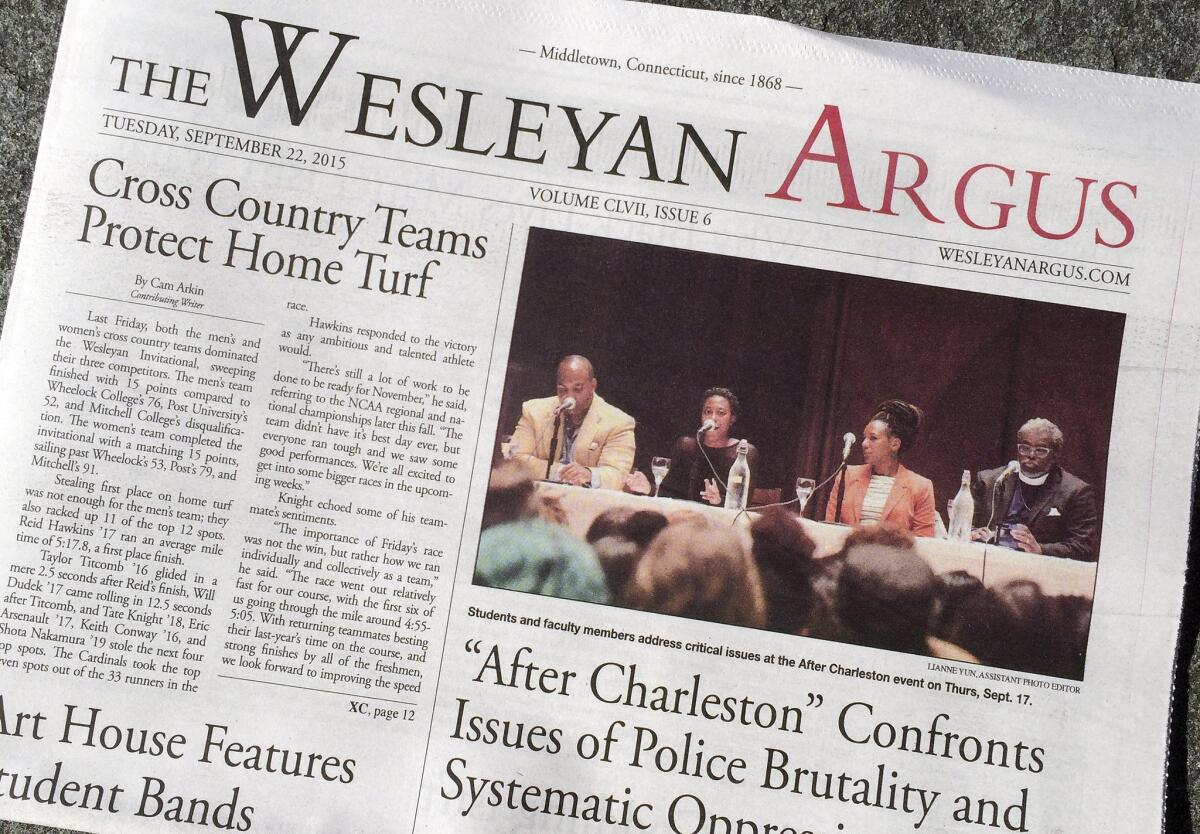Editorial: At U.S. colleges, a failing grade in free speech

The Wesleyan Argus student newspaper is displayed on the campus of Wesleyan University in Middletown, Conn Sept. 24.
- Share via
Colleges are supposed to be places where students are exposed to a variety of opinions. Increasingly, however, administrators and students alike are deciding that free speech on campus must be stifled lest it undermine students’ fragile self-esteem. The pretext is often a desire to provide a “safe space” for students, but the result is an environment in which the open expression of unpopular ideas is frowned upon as dangerous and unacceptable.
Two recent examples exemplify this troublesome trend.
When a student group at Williams College in Massachusetts invited Suzanne Venker, an author and Fox News contributor, to participate in a student-run “Uncomfortable Learning” lecture series, there was a backlash and the organizers canceled her appearance. Venker’s views are indeed controversial; she has called feminism a failure because “it denies the existence of biology and teaches that equality means sameness, which is a losing proposition when it comes to planning a life — particularly if that life includes marriage and family.” But should those views make her persona non grata on campus?
The Record, the student newspaper at Williams, thought so. In an editorial this month, it argued that “the college should not allow speech that challenges fundamental human rights and devalues people based on identity markers.... It is possible that some speech is too harmful to invite to campus. The college should be a safe space for students, a place where people respect others’ identities.”
A similar disregard for free speech characterized the reaction to an op-ed column in the Argus, the student newspaper at Wesleyan University in Connecticut. The author, a student, had suggested that it was “plausible” that Black Lives Matter protests had “created the conditions” that led to rioting and attacks on police. A petition calling for defunding the paper said it had neglected to “provide a safe space for the voices of students of color.” (By “safe space,” the petitioners seemingly had in mind a newspaper free of opinions they find offensive.)
Wesleyan’s president, Michael Roth, reacted to the protests by reminding students that “we always have the right to respond with our own opinions, but there is no right not to be offended.” That lesson apparently didn’t sink in. The student government later voted to cut funding for the paper in half. At Williams, however, there were some sober second thoughts at the student newspaper. The editor in chief admitted in a subsequent article that “our editorial, as written, does advocate for limited free speech, and that was a mistake.”
It’s a mistake, alas, that is made all too often at colleges that, in the name of keeping students “safe,” stunt their intellectual growth.
Follow the Opinion section on Twitter @latimesopinion and Facebook
MORE EDITORIALS:
Do you want to know if your doctor is on probation?
Can you be born in Texas and not be an American?
L.A.’s affordable housing problems demand tough choices, now
More to Read
A cure for the common opinion
Get thought-provoking perspectives with our weekly newsletter.
You may occasionally receive promotional content from the Los Angeles Times.






